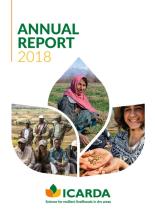Land Library Search
Through our robust search engine, you can search for any item of the over 73,000 highly curated resources in the Land Library.
If you would like to find an overview of what is possible, feel free to peruse the Search Guide.
/ library resources
Showing items 1 through 9 of 14.ICARDA continued to play a critical role in the development, improvement, and dissemination of climate-resilient crop varieties last year.
Widespread heat waves, floods, and droughts last year were a strong reminder of the threats posed by climate change. In the non-tropical dry areas where ICARDA works we are becoming accustomed to record high temperatures and increasing water scarcity year on year.
Rangelands are the mainstay of pastoral livelihoods worldwide. Within rangelands, there are landscape depressions or lowlands characterized by high production potentials with their unique edaphic and hydrologic properties.
The main objective of this study is to introduce the first consistent long term land cover database for Jordan.
Research on micro-catchment rainwater harvesting techniques by ICARDA and Jordanian
scientists has led to the establishment of semicircular bunds on contour ridges and furrows
(using GPS laser-guided Vallerani machine) and runoff strips in two communities of Jordan
This document is a synthesis of outcomes from a knowledge process that was a collaborative effort involving researchers, scientists, and technicians from Iran, Jordan, Morocco, Tunisia, and Yemen.
Water scarcity and land degradation are widespread problems that affect agricultural productivity, food security and environmental quality in several parts of the world, particularly in the dry areas.
This publication is a baseline assessment reviewing the current knowledge of land degradation in the rangelands of Jordan - known as Badia - with a special focus on its causes.
This issue of Caravan describes the new program, and some of the research innovations it will build on. The issue begins with two ‘opinion pieces’ by scientists from partner organizations in the CRP.









